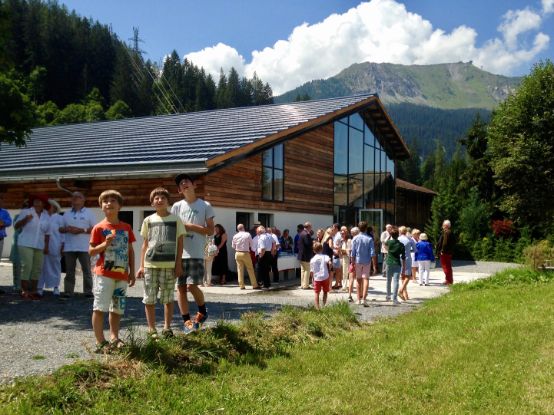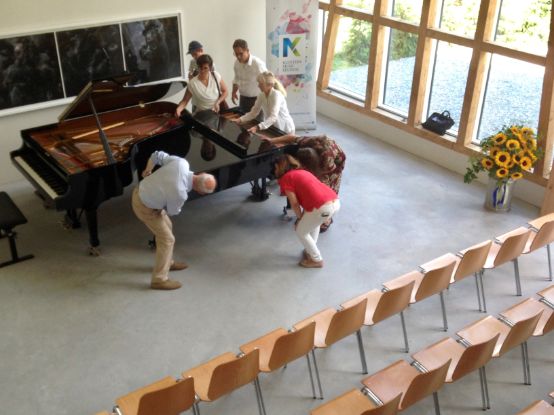English music culture in the Alps
From July 27 to August 4, the Klosters Music Festival, an initiative with ambitions, brought an entire series of performances with internationally renowned names for the first time.

Klosters and Davos are separated by just thirteen kilometers by car and four hundred meters in altitude. There has been a music festival in Davos for 33 years now, and Klosters also founded one a year ago. On the first Saturday in August, Klosters comes to an end and Davos begins at the same time. Can that work? Most probably yes. Admittedly, there still seems to be a slight lack of good neighborly communication, and it has been said here and there that these summer festivals in the Alps are slowly coming to an end; but firstly, the program concepts of Davos and Klosters are completely different, so that they don't steal each other's thunder, and secondly, the market is far from being oversaturated. The classical music audience, often apostrophized as conservative, is extremely keen to travel during the vacation season and appreciates listening to music in a different environment, close to nature and away from the stress of everyday urban life.
So the people in charge in Klosters thought it was a good idea to add a new company with its own face to the established festivals in Verbier, Gstaad and neighboring Davos. The festival is supported by a local initiative group, around sixty volunteers ensure that everything runs smoothly and the budget of around 600,000 francs is largely financed by private individuals. After a trial run limited to one weekend last year, the program this time presented nine orchestral, chamber music and soloist concerts with works ranging from baroque to easily digestible modern classical music. Preference is given to performances in a traditional concert setting with internationally renowned names that guarantee a high standard of interpretation, including Swiss performers; experiments such as those in Davos are avoided. The halls, a multi-purpose hall with five hundred seats and the old village church with three hundred seats, as well as the very spacious showroom in the studio house of visual artist Christian Bolt, were filled to over eighty percent capacity on average. A kind of welcome tent has also been set up at the station, where people can meet informally and listen to alternative sounds ranging from jazz to folk music during the day.
Royal foreword
Many of the wealthy visitors come to Klosters for a long weekend, and the catchment area extends beyond Switzerland to Vienna. However, the regular visitors are vacation guests and second home owners from Klosters and the surrounding area, including a striking number from England. English is practically the second language not only in the village, but also at the festival, which is also reflected in the name: Klosters Music Festival. Prince Charles, who has been spending his winter vacations here for decades, has written a foreword for the program booklet, and where the royals have their blessing, nothing can really go wrong.
The locals have recognized the advantage of this English connection and have hired a top-class artistic director in David Whelton, the long-time, now retired artistic director of the London Philharmonia Orchestra. Just as Martin Engström was able to make use of his connections to the record industry when setting up the Verbier Festival, Whelton is now also drawing on the artist contacts from his time with the orchestra. He is assisted by Raluca Matei, manager of the Camerata Zurich, as head of organization.
-

- Photo: Max Nyffeler
- Setting up the two grand pianos in the Christian Bolt artist studio for the Lithuanian piano duo Vilija Poskute & Tomas Daukantas
Success with investment requirements
The pianist Nikolai Luganski, the Tetzlaff Trio and the Lithuanian piano duo Vilija Poskute & Tomas Daukantas set striking accents in this year's program. The Bernese early music ensemble Les Passions de l'âme with its director Meret Lüthi gave an exciting insight into the heyday of the Austrian Baroque with works by Heinrich Ignaz Franz Biber, Johann Joseph Fux and father and son Schmelzer. Some pieces referred to the Turkish siege of Vienna and the liberation in 1683 with the help of the Polish cavalry - program music with the noise of battle, the patter of horses and victory chorales. Accompanied by the Basel Chamber Orchestra, Russian soprano Julia Lezhneva shone with arias from the opera seria period; she is still the intonation-sure trilling lark she was at the beginning of her career around 2010, when she first appeared with Marc Minkowski in Salzburg, even if her feather-light soprano voice has since tended more towards mezzo.
The final highlight was two evenings dedicated to Robert Schumann with the Deutsche Kammerphilharmonie Bremen under Paavo Järvi. With a passionate interpretation of three symphonies, the cello concerto played with devotion by Steven Isserlis and the rarely programmed concert piece for four horns and orchestra, with the quartet German Hornsound as soloists, the Bremen orchestra filled the audience with enthusiasm. However, they also showed the limits of the hall's acoustics, both upwards and downwards: In the orchestral fortissimo, the transparency of the sound diminishes, and in quiet passages, the ventilation plays an unmistakable part. In order for the festival to fully exploit its undoubted future potential, additional investment in infrastructure is probably unavoidable.








